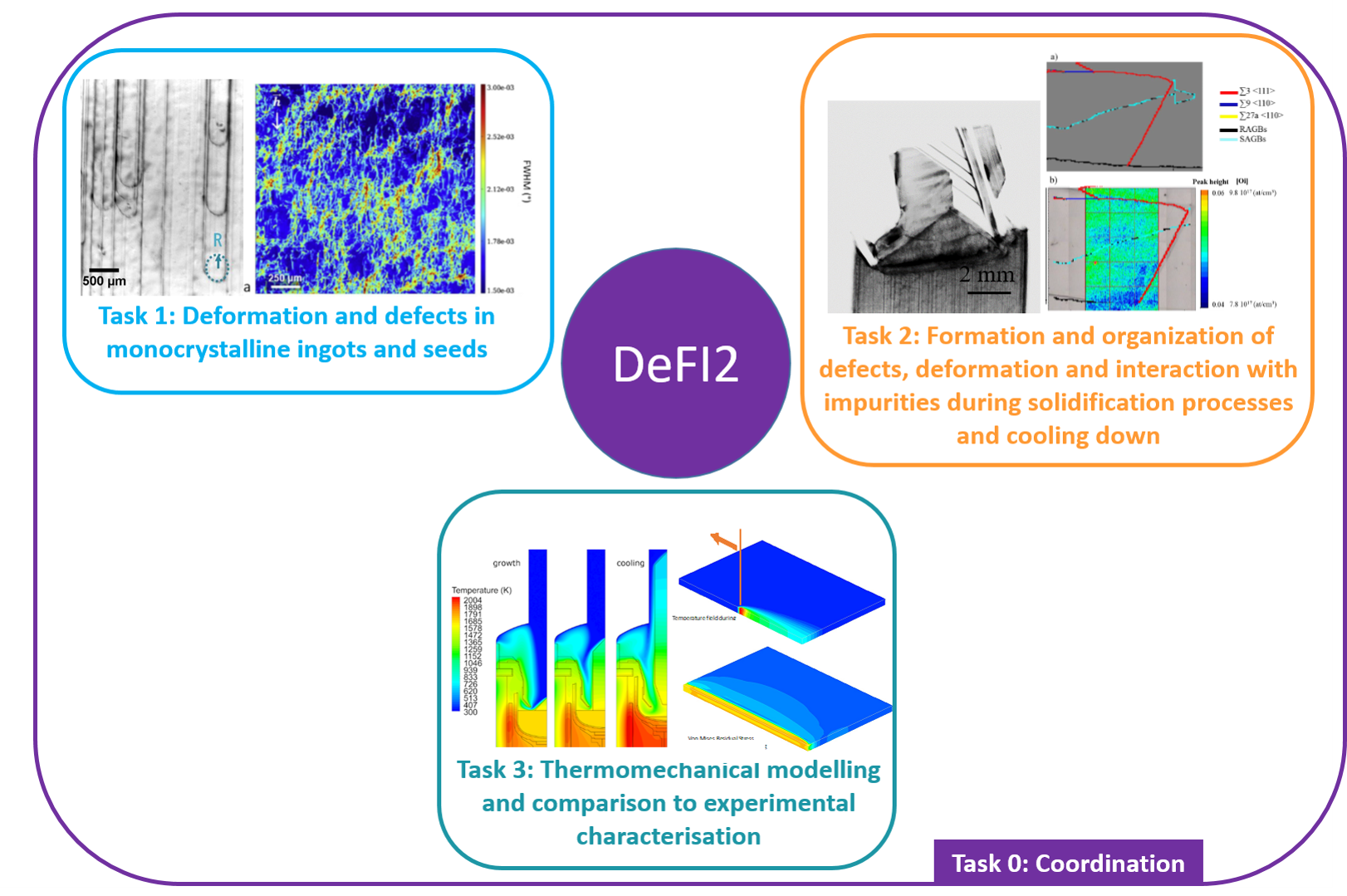
Des procédés innovants pour la fabrication de lingots de silicium (Si) pour les cellules photovoltaïques (PV) sont actuellement mis en œuvre dans l’industrie. La demande récente de plaquettes de plus grandes dimensions génère de nouvelles questions concernant les défauts cristallins et les contraintes mécaniques. Pour répondre à ces questions scientifiques clés, le projet DeFI2 se concentre sur les mécanismes de déformation de la structure cristalline, sur l'origine et la propagation des principaux défauts structuraux, sur l'impact de l'oxygène qui est l'une des impuretés les plus délétères, en particulier pour le procédé Czochralski (Cz) (lingots monocristallins) et des dopants avec une attention particulière pour le gallium du fait de son importance actuelle. Les objectifs du projet seront atteints par une approche conjointe et interdisciplinaire à la fois expérimentale et de simulation basée sur des compétences et des outils originaux ou uniques : caractérisation de la dynamique des défauts (études in situ) et de la déformation en présence ou non d'impuretés; simulation thermomécanique à l'échelle des grains et des lingots pour évaluer les champs de contrainte résiduelle multi-échelles et l’impact sur les défauts; caractérisation des propriétés électriques pour les défauts étudiés. Le projet DeFI2 contribuera à la compréhension des phénomènes de base concernant la déformation et les défauts, permettra le développement de modèles thermomécaniques adaptés et de dispositifs expérimentaux de caractérisation avancée. Le sujet de la déformation du Si pendant le procédé de fabrication est d'un intérêt majeur pour l'industrie PV française de production de lingots Cast-mono. De plus, les connaissances acquises sur l'organisation des défauts structuraux dans les lingots de Cz de grande taille et sur leur impact sur la durée de vie des porteurs pourraient apporter une contribution dans le contexte du développement en Europe d’usines de cellules solaires, hétérojonctions ou TOPCon, à base de Si.
Defects and deformation in crystalline silicon ingots for photovoltaic applications towards the industrial processes
Innovative processes for the fabrication of silicon (Si) ingots for photovoltaic (PV) cells are presently implemented in industrial plants. The recent demand for larger wafer dimensions generates new issues regarding the crystal defects and mechanical stress. To answer to these scientific key-issues, the DeFI2 project focuses on the mechanisms of the crystal structure deformation, on the origin and propagation of main structural defects, on the impact of the oxygen which is one of the most deleterious impurities, in particular for the mono-crystalline Czochralski (Cz) process and of doping impurities with a particular focus on Gallium due to its current importance. The objectives of the project will be achieved by an interdisciplinary joint experimental and simulation approach based on original or unique tools and skills: characterisation of the dynamics of structural defects (in situ studies) and deformation in the presence or not of impurities; simulation of the thermomechanical history at grain- and ingot- scales to evaluate the multiscale residual stress fields and their impact on defects; characterization of the electrical properties for the defects under study. The DeFI2 project will contribute to the understanding of the basic phenomena concerning deformation and defects, allow the development of adapted thermomechanical models, and of experimental advanced characterisation devices. The subject of Si deformation during the manufacturing process, on which the DeFI2 project will provide basic knowledge, is of major interest for the French PV industry working on the growth of Cast-mono ingots. Moreover, the knowledge gained on the structural defect organisation in large-size Cz ingots and their impact on carrier lifetimes could contribute to the background for the development in Europe of factories for Si-based solar cells, heterojunction or TOPCon.



